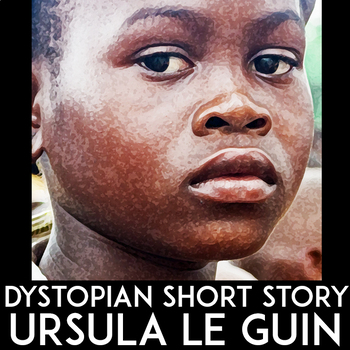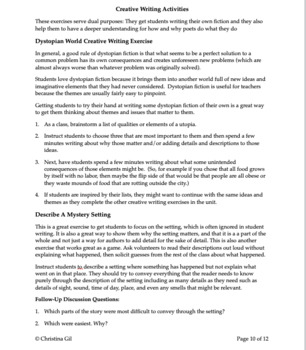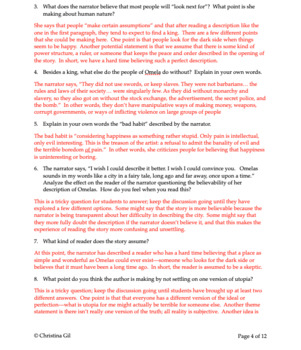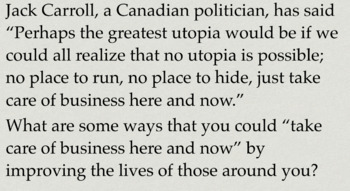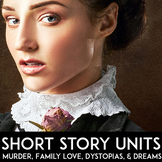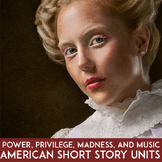The Ones Who Walk Away from Omelas by Ursula K. Le Guin Dystopian Short Story
- Zip
- Google Apps™
- Internet Activities

What educators are saying
Also included in
- Want to empower your students to take charge of their own educations? So many short story resources involve nothing more than checking boxes or filling out pages of meaningless worksheets. This kind of busywork might seem convenient, but it doesn’t teach students any skills that they need. In fact,Price $41.97Original Price $83.37Save $41.40
- Are you worried your American Literature curriculum doesn’t give your students the challenges and support they need to reach their full potential? So many ready-to-go curriculum packages involve meaningless busywork that is both boring and irrelevant for your classes. It might seem convenient, butPrice $39.97Original Price $76.95Save $36.98
Description
Looking for an engaging short story unit that will inspire your classes to make a difference in their worlds?
In this classic of dystopian fiction, Ursula Le Guin describes a city where people celebrate happily without a care in the world—except for one child, kept in miserable conditions.
“The Ones Who Walk Away from Omelas” is a great choice for getting students to think about their own role in perpetuating injustice in the world. It’s also a wonderful text for teaching point of view, setting, and theme. For post-reading activities, I have included readings and TED Talks about modern slavery and child labor, so that students can start to think about ways that they themselves are responsible for the suffering of others. My goal as a teacher is always to get my students thinking for themselves, asking questions, and inspired to take action, and this story is a great choice for those goals.
When you teach “The Ones Who Walk Away from Omelas” with this resource you will:
- start your classes off with bellringer freewrite prompts that will help them to focus, get ready to work, and begin to explore the essential questions of the text
- strengthen your students’ close reading skills by taking them through a close reading of the story with the no-prep questions and handouts
- engage in dynamic discussions about oppression, responsibility, and independent thinking when you challenge your classes with the freewrite prompts, discussion questions, and post-reading resources
- easily review the questions using the extensive answer keys which quote the important passages, so there is no guessing on your part as to which parts of the text are most important
- easily teach the unit with Google Classroom using the ready-to-go instructions, links, handouts, and forms
- help your students to more fully appreciate Le Guin’s writing and to experiment with their own creativity with the proven creative writing activities focusing on setting, point of view, and dystopian fiction
- get to know your students on a deeper level when you help them to clarify their own views on important topics
- have lots of fun teaching this masterpiece of dystopian fiction!
There are no lectures or power points here—students will do the work themselves, with guidance from their teacher. Rather than telling them what the story means, you will be empowering them with the confidence and skills to tackle a challenging text on their own.
The text of the story is not included in this resource because of copyright.
Note: While the main theme of the story is accessible to all levels, the format of the story is subtle and difficult to analyze for some students. Additionally, I recommend that you teach this unit to more mature students because of some of the content. The story mentions the possibility of an orgy and nude priest and priestesses as well as a fictional drug that is a ”as exciting the pleasure of sex beyond all belief.” These are all possibilities of a utopian society as described by the narrator.
Want to see what you’ll get when you buy? Be sure to check out the preview where you can see the resource in its entirety.

